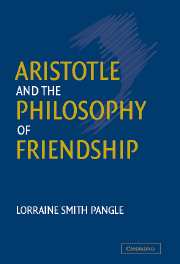Book contents
- Frontmatter
- Contents
- Acknowledgments
- Introduction
- 1 The Challenge of Plato's Lysis
- 2 The Three Kinds of Friendship
- 3 Aristotle and Montaigne on Friendship as the Greatest Good
- 4 Friendships in Politics and the Family
- 5 Cicero's Laelius: Political Friendship at Its Best
- 6 Quarrels, Conflicting Claims, and Dissolutions
- 7 Friends as Other Selves
- 8 Goodwill, Concord, and the Love of Benefactors
- 9 Self-Love and Noble Sacrifice
- 10 Friendship in the Happy Life
- Notes
- Bibliography of Modern Works and Editions
- Index of Names
7 - Friends as Other Selves
Published online by Cambridge University Press: 04 July 2009
- Frontmatter
- Contents
- Acknowledgments
- Introduction
- 1 The Challenge of Plato's Lysis
- 2 The Three Kinds of Friendship
- 3 Aristotle and Montaigne on Friendship as the Greatest Good
- 4 Friendships in Politics and the Family
- 5 Cicero's Laelius: Political Friendship at Its Best
- 6 Quarrels, Conflicting Claims, and Dissolutions
- 7 Friends as Other Selves
- 8 Goodwill, Concord, and the Love of Benefactors
- 9 Self-Love and Noble Sacrifice
- 10 Friendship in the Happy Life
- Notes
- Bibliography of Modern Works and Editions
- Index of Names
Summary
In his long discussion of friendship and equality in 8.7 to 9.3, Aristotle has uncovered much self-interest at work in even the most virtuous friendships. But even if each man does love his own good “most of all” (1159a12), Aristotle has nowhere retracted his insistence that true friends also love one another for their own sakes. How are these two different concerns connected in one soul? Aristotle will suggest now that the love for the friend for his own sake is an extension or expansion of self-love.
The Elements of Friendship
Aristotle begins afresh in 9.4 with a new and fuller definition of friendship, specifying the elements that are universally acknowledged to constitute friendship. Ordinary opinion tends to think of true friendship and self-regard as altogether different, the one springing from noble generosity and the other involving qualities that are base or at best morally neutral. By taking common opinion as his starting point, however, Aristotle shows that the same elements that are agreed to be essential to friendship are found primarily and most completely in a good man's relation to himself: “The features of friendship that are found in friendship toward one's neighbors, in accordance with which the various friendships are defined, seem to come out of those that one has toward oneself” (1166a1–2). In the process, he proves again that the virtuous man is the one most capable of being a good friend to others.
- Type
- Chapter
- Information
- Aristotle and the Philosophy of Friendship , pp. 142 - 154Publisher: Cambridge University PressPrint publication year: 2002

